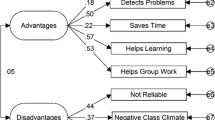Abstract
Despite its potential benefits, factors such as negative perceptions have affected the use of peer assessment in schools. Through applying the concept of ‘paradoxes’, we sought to identify contradictory yet interwoven elements that were inherent in web-mediated peer assessment practices. Applying a phenomenographical approach, we interviewed 6 teachers and 30 students in a secondary school in Singapore, where an online peer assessment tool was used to support students in their English classes. Our findings suggested four main paradoxes: (1) increased student ownership but reduction in teachers’ sense of control over student learning; (2) anonymity of peer comments lowered students’ anxiety but reduced accountability; (3) reviewing multiple peers’ essays increased student feedback but gave rise to more contradictory and nonconstructive comments; and (4) the online peer assessment tool provided a good platform for peer review but overemphasised on the outcomes rather than processes.
Access this chapter
Tax calculation will be finalised at checkout
Purchases are for personal use only
Preview
Unable to display preview. Download preview PDF.
Similar content being viewed by others
References
Topping, K. J. (1998). Peer assessment between students in colleges and universities. Review of Educational Research, 68(3), 249-276.
Topping, K. J. (2005). Trends in peer learning. Educational Psychology, 25(6), 631-645.
Topping, K. J. (2009). Peer assessment. Theory Into Practice, 48, 20-27.
Kaufman, J. H., & Schunn, C. D. (2011). Students’ perceptions about peer assessment for writing: Their origin and impact on revision work. Instructional Science, 39, 387-406.
Li, L. and Steckelberg, A. L. (2006). Perceptions of web-mediated peer assessment. Academic Exchange Quarterly, 10(2). 265-270.
Orzolek, D. C. (2006). The paradox of assessment: Assessment as paradox [Electronic version]. Research and Issues in Music Education, 4. Retrieved April 1, 2011 from http://www.stthomas.edu/rimeonline/vol4/orzolek.htm
Colwell, R. (2003). The status of arts assessment. Examples from music. Arts Education Policy Review, 105(2), 10-17.
Andriopoulos, C. (2003). Six Paradoxes in Managing Creativity: An Embracing Act. Long Range Planning, 26, 375–388.
Yang, Y.-F., & Tsai, C.-C. (2010). Conceptions of and approaches to learning through online peer assessment. Learning and Instruction, 20(1), 72–83.
Zevenbergen, R. (2001). Peer assessment of student constructed posters: assessment alternatives in preservice mathematics education. Journal of Mathematics Teacher Education, 4 (2), 95-113.
Beaman, R. (1998) The unquiet…even loud andragogy! Alternative assessments for adult learners. Innovative Higher Education, 23(1), 47-59.
Bangert, A.W., (1995), Peer assessment: An instructional strategy for effectively implementing performance-based assessment, Dissertation Abstracts International, 56, 3505.
Douchy, F., Segers, M., & Slujismans, D. (1999). The use of self-, peer and co-assessment in higher education: A review. Studies in Higher Education. 24 . 331-350.
Lin, S. S. J., Liu, E. Z. F., & Yuan, S. M. (2002). Student Attitudes toward Networked Peer Assessment: Case Studies of Undergraduate Students and Senior High School Students. International Journal of Instructional Media, 29(2), 241-254.
Hanrahan, S. and Isaacs, G. (2001). Assessing self- and peer-assessment: the students’ views.Higher Education Research and Development, 20(1), pp.53-71.
Liu, N. and Carless, D. (2006). Peer feedback: the learning element of peer assessment. Teaching in Higher Education, 11(3), pp.279-290.
Cho, K. & MacArthur, C. (2010) Student revision with peer and expert reviewing. Learning and Instruction, 20, 328-338.
Cho, K., & Schunn, C. D. (2007). Scaffolded writing and rewriting in the discipline: A web-based reciprocal peer review system. Computers and Education, 48(3), 409-426.
Vanderhoven, E., Raes, A., Schellens, T., & Montrieux, H. (2012). Face-to-face peer assessment in secondary education: does anonymity matter? In Z. Bekirogullari (Ed.), Procedia: Social & Behavioral Sciences, 69, 1340–1347. Presented at the 3rd International Conference on Education & Educational Psychology (ICEEPSY 2012), Elsevier.
Strijbos, J.-W. & Sluijsmans, D. (2010). Unraveling peer assessment: Methodological, functional, and conceptual developments. Learning and Instruction, 20(4), 265–269.
Cheng, K. H. & Tsai, C. C. (2012). Students’ interpersonal perspectives on, conceptions of and approaches to learning in online peer assessment. Australasian Journal of Educational Technology, 28(4), 599-618. Retrieved online from http://www.ascilite.org.au/ajet/ajet28/chengkh. html on April 1, 2014.
Marton, F., & Booth, S. (1997). Learning and Awareness. New Jersey: Lawerence Erlbaum Associates.
Author information
Authors and Affiliations
Corresponding author
Editor information
Editors and Affiliations
Rights and permissions
Copyright information
© 2015 Springer-Verlag Berlin Heidelberg
About this paper
Cite this paper
Tay, W.Y., Ng, Z.Y. (2015). Paradoxical tensions of online peer assessment: A case study of a secondary school in Singapore. In: Chen, G., Kumar, V., Kinshuk, ., Huang, R., Kong, S. (eds) Emerging Issues in Smart Learning. Lecture Notes in Educational Technology. Springer, Berlin, Heidelberg. https://doi.org/10.1007/978-3-662-44188-6_36
Download citation
DOI: https://doi.org/10.1007/978-3-662-44188-6_36
Published:
Publisher Name: Springer, Berlin, Heidelberg
Print ISBN: 978-3-662-44187-9
Online ISBN: 978-3-662-44188-6
eBook Packages: Humanities, Social Sciences and LawSocial Sciences (R0)




